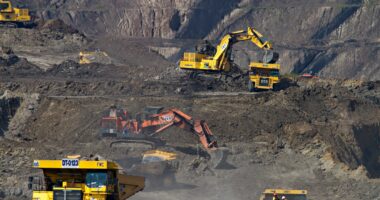In 2021, Canada was the world’s third largest producer of uranium, behind Kazakhstan and Namibia. That production comes from only two mines, and more sources are needed to meet rising demand. Between 2018 and 2020, $1.25 billion was spent globally on exploration and development of further uranium resources. Canada accounted for 44% of that total, more than the next four countries combined.
Uranium is needed for nuclear power which is an emission-free source of energy. Just last year, the Canada Infrastructure Bank (a federal Crown Corporation of Canada) committed C$970 million toward the country’s first small modular reactor (SMR) in Ontario. Ontario Power Generation, itself a provincial Crown corporation owned by Ontario, will build and operate the reactor. SMRs represent the next wave of nuclear development, and the initial project is expected to lead to others across the country. It is estimated that the SMR will provide power while eliminating emissions equivalent to those of 160,000 gas cars.
Canada considers uranium a critical mineral and has committed to creating more domestic sources of uranium. Fortunately, Saskatchewan’s Athabasca Basin is home to the world’s largest high-grade uranium deposits. The world’s largest uranium mine, the McArthur River Mine, is located there, as is the Cigar Lake Mine, the highest-grade uranium mine in the world.
There is a lot of exploration happening in the region, and understandably so. One interesting recent development centers around a major land package acquired by Stallion Discoveries Corp. (TSX-V: STUD) (OTCQB: STLNF). As the name implies, Stallion is in the discovery business, and key members of the company have a history of successful uranium exploration in the Athabasca Basin.
The Land
Stallion Discoveries acquired two companies, Hathor Exploration Ltd. and U92 Exploration Limited, in January, 2023. The deal netted a 100% interest in 78,831 hectares (about 304 square miles) of mineral claims in the Athabasca Basin. The bulk of the claims, 67,957 hectares worth, are located in the western portion of the basin in the neighborhood of a flurry of discoveries and exploration.
The eastern area of the basin houses the two active mines and several historic, decommissioned mines. The western region is home to fewer historic, yet still prolific, mines like Cluff Lake, but it is the area with more new discoveries as of late. Fission Uranium’s PLS project, F3 Uranium’s PLN project, and NexGen Energy’s Rook 1 project are all located in the immediate vicinity of Stallion’s claims. Rook 1 is the furthest along toward actually becoming a mine, but all three have shown high grade uranium deposits.
Stallion Discoveries is conducting an extensive Versatile Time-Domain Electromagnetic (VTEMTM Plus) geophysical survey over all 78,831 hectares of its holdings. The VTEM™ system, developed by Geotech, is a cutting edge aerial technology capable of ‘seeing’ beneath the surface with unprecedented accuracy, identifying conductive mineral deposits without touching the ground. The system was used a few years ago to help develop a model of the basement geology on the McArthur River Project.
Based off of the findings from the VTEM™ survey, Stallion will be able to hone in on the best areas for further exploration as it seeks to define a significant uranium resource
The History
The name Hathor Exploration may ring a bell for those who have been following uranium resource development in Canada. The original iteration of the company bought and developed the Roughrider Deposit between 2006 and 2011, identifying an NI 43-101 compliant resource (indicated and inferred) of 57.94 million pounds of uranium. At the time, it was hailed as the third-highest graded uranium deposit in the world behind the McArthur River and Cigar Lake deposits.
In August 2011, Cameco made an offer to buy Hathor for C$3.75/share. Rio Tinto then got involved and a bidding war ensued, resulting in Rio Tinto buying the company for C$4.70/share which worked out to US$550 million. In 2013, the project was partially through the Environmental Impact Statement review process before it went dormant for reasons that are unclear. Rio Tinto recently sold the project to Uranium Energy Corp. for $150 million, and UEC intends to resurrect the project.
All of that is not really the concern of Hathor shareholders, or for other explorers following a similar model of defining a resource prior to selling to a major mining company capable of further development. This is the path that lies before Stallion Discoveries.
Stephen Stanley was the President and CEO of the original Hathor Exploration leading up to the sale in 2011. With the new iteration of Hathor being acquired by Stallion Discoveries he is back in the game. He is a major investor in Stallion and is an Advisor to the Board of Directors. Mr. Stanley and the company are looking to repeat that type of success with the new claim package in the Athabasca Basin.
The Overall Picture
It should be noted that insiders and key stakeholders control about 32% of the company’s 79 million outstanding shares, with 8 million warrants out currently. According to CEO Drew Zimmerman, those insiders are looking for a big return from the major discoveries the company is pursuing and are focused on holding their positions over the long term, ensuring that the company’s objectives are aligned with those of the shareholders.
Stallion Discoveries also holds significant claims in historically- and currently-producing areas of Idaho and Nevada, centered around gold exploration with the potential for polymetallic deposits as well. But that is the subject for another day.
Here, the focus is on the uranium opportunity in the home of the world’s highest grade deposits. With the federal and provincial governments of Canada focused on nuclear energy and uranium mining development, investors may want to consider the potential upside offered by explorers in the region. Stay tuned for further developments from Stallion Discoveries.










